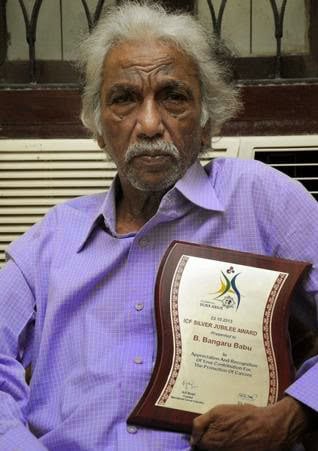Bangaru Babu recently turned 99. Celebrated as the Godfather of Carrom, he has more than 75 years of Carrom to his credit, which includes multiple National championship wins. His moniker was not lightly earned; but for this Chennai icon, Carrom – recognised today as an International sport – would have remained little more than a pastime. Madras Musings spoke to him at his house in Shenoy Nagar, aptly christened ‘Carrom Villa.’
 Babu’s golden run with Carrom began in 1948 in Chennai, a city considered home to the game ever since it grew in the bylanes of North Madras. Initially an amusement, Carrom’s emergence as a competitive sport was heralded by the numerous clubs that sprouted as its popularity swelled. These clubs – and sometimes modest hutments – offered Carrom enthusiasts boards for rent, by the hour or based on performance. Bangaru Babu, along with a group of like-minded players, saw the potential to develop the game into an organised sport. By January 1950, the Madras State Carrom Association (MSCA) was founded. The MSCA had the distinction of being the first-ever Carrom association to be formed anywhere in the world, and was inaugurated by the then Mayor of Madras. MSCA conducted the first league championship in 1951. It went on to conduct the first State-level tournament in 1954, an event which saw the emergence of many talented and ranked players. Thus with the unflagging efforts of Bangaru Babu and his team, Carrom flourished into a sport and shortly, the All India Carrom Federation was formed on March 4, 1954.
Babu’s golden run with Carrom began in 1948 in Chennai, a city considered home to the game ever since it grew in the bylanes of North Madras. Initially an amusement, Carrom’s emergence as a competitive sport was heralded by the numerous clubs that sprouted as its popularity swelled. These clubs – and sometimes modest hutments – offered Carrom enthusiasts boards for rent, by the hour or based on performance. Bangaru Babu, along with a group of like-minded players, saw the potential to develop the game into an organised sport. By January 1950, the Madras State Carrom Association (MSCA) was founded. The MSCA had the distinction of being the first-ever Carrom association to be formed anywhere in the world, and was inaugurated by the then Mayor of Madras. MSCA conducted the first league championship in 1951. It went on to conduct the first State-level tournament in 1954, an event which saw the emergence of many talented and ranked players. Thus with the unflagging efforts of Bangaru Babu and his team, Carrom flourished into a sport and shortly, the All India Carrom Federation was formed on March 4, 1954.
In 1957, Babu himself served as the General Secretary of the MSCA. By then, the game saw a profusion of talent – men and women, both – appearing all across the country. India had begun to host National championships in the sport. But Babu’s dreams were bigger – his new goal was to propel Carrom into an organised sport at the International level. Carrom’s first brush with global popularity took place in Sri Lanka, where the game gained favour in the 1950s. And so, in December 1960 Babu led a team from MSCA to Sri Lanka to play an invitation tournament. His team defeated the Ceylon Whites in the finals, emerging the winner in both the men’s and women’s categories. Only two players from the historic contingent are alive today – Babu, and one other. Babu’s continued efforts to make Carrom an international sport bore fruit during the first Asian Games that took place in New Delhi in 1982.
The event hosted an exhibition match featuring Indian talents Dilli and Lazar. The demonstration was quite successful – Japan, Korea, Thailand and Indonesia responded favourably and expressed interest in promoting Carrom in their countries. In 1985, Babu and his team went to Zurich to compete in the first-ever Intercontinental Carrom Test Tournament. Apart from Babu, the contingent included Arun Gaddar and Maria Irudayam. The team also visited Berlin and played in team tournaments.
Chennai, October 1988 saw a historic day in the sport – Babu succeeded in forming the International Carrom Federation (ICF) with delegates from the United States, West Germany, Switzerland, Malaysia, Sri Lanka, France, Spain and India. The Federation was instrumental in laying down standard laws and guidelines for international competitions. Thanks to Babu, Carrom had evolved into an International sport. His unparalleled service to the development of Carrom is hailed as a great achievement. David Ravikumar, a seasoned sports administrator from Tamil Nadu who worked alongside Babu up until the formation of the ICF says that it is unfortunate that Babu had to step down from being an active officer bearer in deference to the tenure rules. “Every sport needs a great mentor like him for promotion and development,” he says.